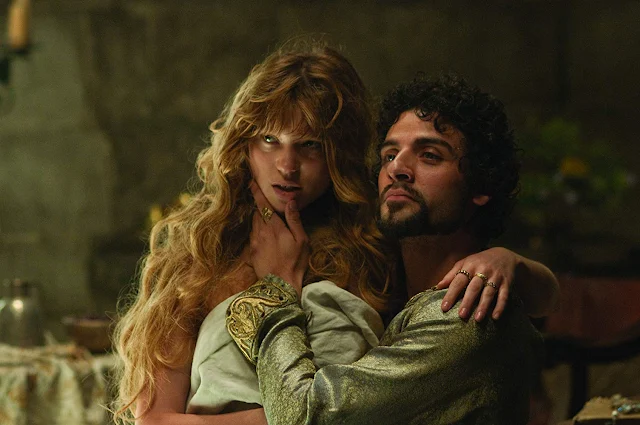 |
| William Hurt in Altered States |
Cast: William Hurt, Blair Brown, Bob Balaban, Charles Haid, Thaao Penghlis, Miguel Godreau, Dori Brenner, Peter Brandon, Charles White-Eagle, Drew Barrymore, Megan Jeffers. Screenplay: Paddy Chayefsky, based on his novel. Cinematography: Jordan Cronenweth. Production design: Richard Macdonald. Film editing: Eric Jenkins. Music: John Corigliano.
In theory, choosing Ken Russell to direct Paddy Chayefsky's screenplay based on his novel, an updating of Robert Louis Stevenson's 1886 novella Dr. Jekyll and Mr. Hyde to the psychedelic era, had some potential. Russell is known for his flamboyant visuals and Chayefsky for his talky screenplays like the Oscar-winning Marty (Delbert Mann, 1955), The Hospital (Arthur Hiller, 1971), and Network (Sidney Lumet, 1976). Perhaps the visuals would moderate the verbosity, or vice versa. Unfortunately, Altered States wound up something of a mess -- a watchable mess, but still not a satisfying film. Chayefsky was so upset with the movie he took his name off the credits and substituted a pseudonym, Sidney Aaron. But the problem is inherent in the premise: that a potion can alter not only the mental state of the person who takes it but also the physical state -- that matter itself, the human body, can be changed by drinking a mixture of blood and hallucinogenic mushrooms. It's the stuff of fairy tales, not science. So when Dr. Jessup (William Hurt in his film debut), a respected physician researching the causes of schizophrenia, drinks the concoction, he reverts to his primordial self: a small, aggressive carnivorous simian. Good enough for a horror-movie setup, but not quite what Chayefsky had in mind when he wrote lines like these: "It is the Self, the individual mind, that contains immortality and ultimate truth.... Ever since we dispensed with God we've got nothing but ourselves to explain this meaningless horror of life." Chayefsky's existential conundrums go missing in a welter of special effects. And ultimately, the film collapses in bathos, with a plot resolution in which love conquers all after Jessup's experiments go calamitously awry. Hurt and Blair Brown as Jessup's wife do what they can with the material, giving controlled performances, but Russell, that connoisseur of excess, lets Charles Haid overplay his role as Dr. Parrish, the supposed skeptic about Jessup's research who seems like a nutcase himself.















